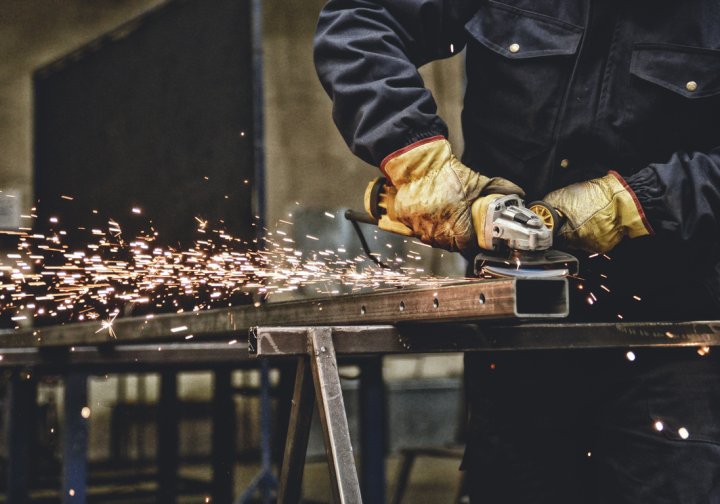Skills, digital adoption and supply chains were among the topics discussed at East Midlands Chamber’s Manufacturing and Engineering Conference, held at headline partner the University of Derby’s Enterprise Centre yesterday (16 March) and part of the Derbyshire Festival of Business. Dan Robinson rounds up the key themes affecting SMEs.
Manufacturing remains a crucial part of the UK and East Midlands economy
Manufacturing delivers £183bn in output to the UK economy, employs 2.5 million people with 12% higher salaries than average, generates half the country’s exports and accounts for two-thirds of R&D activity.
The highest proportion of people working in the industry can be found in the East Midlands, where it employs 264,000 people and is responsible for 16% of the region’s output.
It faces clear challenges, however. East Midlands Chamber’s chief executive Scott Knowles pointed out how overseas sales for East Midlands manufacturers decreased for a net 27% of firms between Q4 2021 and Q1 2022 in the Quarterly Economic Survey.
Skills and inflationary pressures are also prevalent, with four in five of firms that attempted to hire struggling to find the right people and a similar proportion expecting prices to rise.
Scott says: “If you looked at our survey 10 years ago, it pretty much said the same thing, but the challenges feel a lot more acute at the moment.”
Supply chains are under the microscope
A quarter of manufacturers are reviewing their supply chains, according to Make UK’s latest research, with shortening the most likely outcome.
Tim McLean, founder and principal at global consultancy TXM Lean Solutions, highlights a 2019 McKinsey study that found a major event causing a month’s worth of disruption happened every 3.7 years.
“the savings you might make from sourcing those goods on the other side of the world might be wiped out for the next two years because of that one month of not being able to supply something,” he says.
“So people are looking a lot more at supply chain risk rather than simple unit costs, which will be very beneficial for manufacturers here.”
Tidyco, a Derby-based supplier of hydraulic and pneumatic products to the UK rail industry, already prioritises local suppliers because customers prefer quality over price, according to production director Philip Mason.
He adds: “One thing we do is rail braking systems so we can’t just get some piece of cheap metal, stick it on a train and hope for the best. So while it might cost a bit more to buy locally, our customers are happy because they know the history of the parts and they value British manufacturing.”
Automating jobs doesn’t necessarily equate to losing jobs
“Robots will take away jobs but you’ll get a better one” is a line by one manufacturer quoted at the conference. A member of Make UK, the industry’s trade body, can testify to this after investing in robotic welders, as well as their employees with softer skills and technical training.
Charlotte Horobin, Midlands region director for Make UK, says: “It’s meant some people were able to take on a new role to maintain the robotic welders, but also the existing welders have been upskilled to do the specialist work the company wouldn’t normally be able to achieve.
“The MD is now out trying to grow its order book based on these new skillsets. The company’s headcount has grown by 50% and salaries increased by 20%.”
Skills remain top of the agenda and is starts in schools
Derbyshire County Council deputy leader Simon Spencer remembers skills programmes that improve opportunities for young people being at the top of the agenda during conversations 30 years ago, so not much has changed in this respect.
Six in 10 manufacturers believe one-fifth of their workforce could retire within the next decade, according to Make UK, and labour turnover was 25% last year – by contrast, it was 8% in 2016.
Charlotte says: “No matter what we’ve been through, skills remain at the heart of everything – helping people into the sector, upskilling and bridging for retirement.”
The key to building a skilled workforce begins at school, believes Tidyco’s Philip, who has worked with local teachers to introduce metalwork on to the curriculum. “It gives them an idea that engineering is something they can actually do,” he adds.
Digital adoption is key to future prospects – but don’t overwhelm with language
Manufacturers often just “get on with what they always do”, says TJ Duncan-Moir, meaning they rarely do much marketing or networking. “They build relationships with repeat business,” says the owner of consultancy Business Glu.
Smaller outfits can be difficult to engage with among organisations that support SMEs to adopt digital technology to fuel growth.
This is the aim of The Future is Now campaign by the D2N2 Local Enterprise Partnership, which encourages small manufacturers to maintain competitiveness by using digital tools.
Head of business and innovation Frank Horsley says: “Language is important – innovation isn’t something to be scared of and we’re trying to give SME manufacturers the confidence to embrace it by promoting tangible business benefits such as improving productivity, speeding things up and cutting costs.”
Adam Bates, general manager at signage maker Hardy Signs, adds: “A lot of digital improvements we’ve made in the past few years are smaller and modular to make progressive steps towards a bigger vision.”








